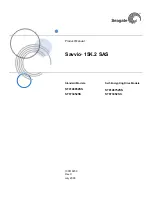
JUNOSe 10.2.2 Release Notes
34
Known Problems and Limitations
System Logging
If you enable engineering logs and set the control network logs to a level of
notice or lower (down from the default of error), you might see erroneous
controlNetwork log messages like the following that are generated because
SNMP polling on line modules (correctly) detects no fabric: [Defect ID 43168]
NOTICE 09/01/2002 18:47:52 CEST controlNetwork (slot 11): Control Bus
Master slave error 0x5 while accessing slot
Tunneling
When you configure the GE-2 line module, the GE-HDE line module, or the
ES2-S1 GE-4 IOA to operate as a shared tunnel-server module, the available
bandwidth for tunnel services is limited to 0.5 Gbps per module.
In releases numbered lower than Release 7.3.0, a dynamic tunnel-server port
was located on port 8 of the GE-HDE line module and GE-8 I/O module.
In Release 7.3.0 and higher-numbered releases, the dynamic tunnel-server port
is located on port 9. When you upgrade to Release 7.3.0, any existing
tunnel-server port configurations move from port 8 to port 9.
Known Problems and Limitations
This section identifies the known problems and limitations in this release. For more
information about known problems that were discovered at customer sites, you can
log in to the JUNOSe Knowledge Base at https://www2.juniper.net/kb/, enter the
defect ID number in the Search by Keyword field, and click Search.
ANCP
On an E320 router that has established 3000 ANCP adjacencies with a client
and traffic is initiated, the following behavior occurs sporadically: All existing
Telnet sessions are disconnected and no new Telnet sessions can be established
for several minutes. [Defect ID 83872]
ATM
The line module resets when you issue the
show nbma arp
command after you
have configured NBMA interfaces on an ATM line module. [Defect ID 88491]
When you reload an ATM line module that is configured with NBMA circuits as
passive OSPF interfaces and that has established OSPF adjacencies and IBGP
peers (configured on Gigabit Ethernet interfaces), the transmission of OSPF
hello packets might be affected until all the NBMA interfaces have initialized.
[Defect ID 46157]
Work-around:
Either remove the passive OSPF interface statements on the
NBMA interfaces, or statically configure the OSPF cost on the NBMA interfaces.
















































